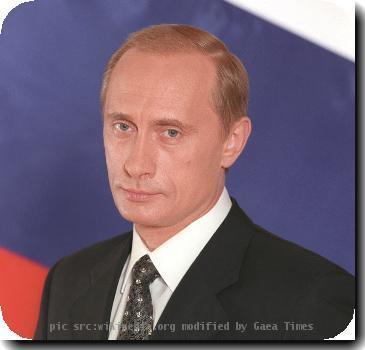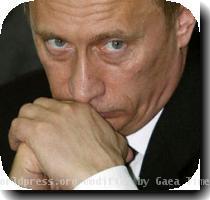Tough, talkative Putin tells Russians he’s considering a return to presidency
By David Nowak, APThursday, December 3, 2009
Putin talks of possible return to presidency
MOSCOW — Wagging his pen and gazing directly into the camera, Prime Minister Vladimir Putin sent his strongest signal yet Thursday that he plans to return to Russia’s presidency, telling millions of TV viewers that he will consider running in 2012.
The former KGB spy, who retains huge power despite formally stepping down after his eight-year presidency in 2008, turned in an electric performance during his annual marathon call-in show — cementing his high rating among the electorate and his reputation as Russia’s No. 1 leader.
Asked if he was leaving the political stage, Putin grinned and said: “Don’t hold your breath.”
The St. Petersburg native declared he would “think about it, there is still enough time,” when questioned on his intent to run again for president.
Although his words were short of an outright declaration, the fact that he would admit to considering a run underlined his steely ambition. There is almost no doubt Putin would win — because of his genuine popularity and the overwhelming political dominance of his United Russia party.
“While he coyly said it’s too early for a decision, it certainly looked like he has already decided” to return to the presidency in 2012, said Nikolai Petrov, an analyst with the Carnegie Moscow Center.
President Dmitry Medvedev, on a visit to Italy, told reporters after the call-in show that “if Putin doesn’t rule out running, neither do I rule myself out” for 2012. He also said that he and Putin will act as “responsible politicians” and reach agreement on the 2012 election to avoid “elbowing one another” — echoing previous comments by Putin.
Putin’s demeanor was no less presidential than any of his appearances from 2000 to 2008. He switched tones effortlessly from coarse to lighthearted, from flippant to wise.
In dealing with questions from a mostly sycophantic audience in the slick, stage-managed event, Putin was at times the efficient bureaucrat, concerned father and learned economist.
A return to the president’s corner office in the Kremlin would mark an end to the power-sharing arrangement he engineered with Medvedev.
Putin, 57, has remained Russia’s consummate leader since constitutional term limits forced him to step down in 2008. He named Medvedev as his anointed successor and, shortly after the election, Medvedev named him prime minister.
The premiership had been a comparatively low-profile position, but Putin has pushed it into the spotlight, logging more TV time in the Medvedev era than the president himself. Medvedev has appeared to be little more than a figurehead and placeholder.
In the past year, Medvedev has made tentative forays out of Putin’s long shadow, with somewhat veiled criticisms of the corruption that plagued Russia under Putin. But his mild manners and legalistic, often-opaque remarks have been no match for Putin’s vigorous, tough-guy image and slangy remarks.
Putin didn’t disappoint during the four-hour call-in show Thursday, deriding Russians who flaunt their wealth.
“There are those so-called nouveau-riche — those who suddenly got rich and don’t know how to behave,” he said, noting that in Soviet times, gold-capped teeth were considered the way to show you were well-off.
“Well, these Lamborghinis and other such frivolous knickknacks are just like those same gold teeth. People who flaunt their wealth against a background of the humble lives of millions of Russians don’t differ in any way from the people who boast about their gold teeth,” Putin said, obviously enjoying the limelight.
Viewers posed what officials said was about 2 million questions by telephone, Internet and SMS, most of which went unanswered. If they felt exhausted by the end of the program, Putin showed no sign of fading.
He opened with his strongest suit — domestic security — by denouncing last week’s bombing of a Moscow-to-St. Petersburg passenger train that killed 26 people.
“We have done a lot to break the spine of terrorism, but the threat is still here,” Putin said. “The entire society, all of us must be aware of that threat.”
Putin rose to prominence early in his first stint as premier in 1999 by launching Russia’s second full-scale war against Chechen separatists, whom officials blamed for a devastating series of apartment-block bombings in Moscow and other cities. Small clashes persist in Chechnya and violence rose sharply in the North Caucasus region this summer.
The train bombing, the first fatal terrorist attack outside the Caucasus in five years, angered and unsettled Russians and is likely to increase their yearning for a leader unhesitant to take brutal measures.
Putin’s return to the Kremlin would likely wipe out any outside chance of significant political reforms. Medvedev’s liberal statements have brought little result and analyst Petrov said he clearly has no mandate to make significant steps toward greater democracy.
Putin also focused heavily on economy during the show, which featured televised links with workers from several industrial towns.
Putin said Russia has “overcome the peak of the crisis” and claimed credit for softening its impact. He added the government will have to spend more money to support the economy in the meantime.
Russia is weathering its worst economic downturn in a decade as commodities prices collapsed late last year. But it emerged from the recession in the third quarter, its GDP rising by a seasonally adjusted 0.6 percent.
Putin congratulated a 55-year-old caller on her birthday and promised to send computers to a provincial school in reply to a student’s plea. He promised more compensation to a widow whose husband was among 75 people killed in an accident at Russia’s largest hydroelectric plant, and offered wage increases and more benefits to others.
“If the situation demands it, I will come to you or to any other place in the Russian Federation, it’s my duty,” he said.
He also expressed disappointment at Russia’s failure to qualify for soccer’s World Cup and complimented the country’s rappers, saying they hold the moral high ground over their Western counterparts for not promoting drugs and alcohol.
In a careful balancing act in response to a question about Josef Stalin, Putin credited the Soviet dictator for his industrialization drive and World War II victory, but he denounced the massive repression of that era.
Putin got visibly riled when the talk turned to the subject of prosecutions that his critics say are politically motivated. He accused former billionaire oil tycoon Mikhail Khodorkovsky and other top shareholders in the Yukos oil company of ordering the killings of opponents and commercial rivals.
Khodorkovsky, once Russia’s richest man, is serving an eight-year sentence on fraud and tax evasion charges widely seen as a punishment for challenging Putin.
Delving into foreign policy, Putin sharply admonished the United States for keeping “anachronistic” Cold War-era trade restrictions imposed to penalize the Soviet Union for its refusal to allow free emigration of the Jews.
“The Soviet Union is gone, but they (restrictions) have remained,” he said.
Putin also accused Washington of hampering Russia’s accession into the World Trade Organization.
“Accession into the WTO remains our strategic goal, but some nations, including the United States, are impeding Russia’s WTO bid,” he said.
Associated Press writers Jim Heintz, Steve Gutterman and Nataliya Vasilyeva in Moscow and Frances D’Emilio in Rome contributed to this report.
Tags: Accidents, Eastern Europe, Europe, International Trade, Moscow, Russia, Vladimir Putin

